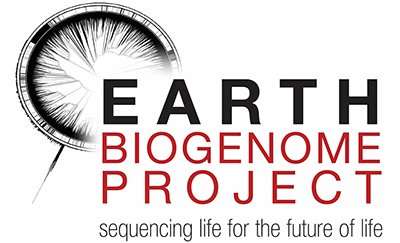Launch of global effort to read genetic code of all complex life on earth

The Earth BioGenome Project (EBP), a global effort to sequence the genetic code, or genomes, of all 1.5 million known animal, plant, protozoan and fungal species on Earth, officially launches today (1 November) as key scientific partners and funders from around the globe gather in London, UK to discuss progress in organising and funding the project.
The EBP will ultimately create a new foundation for biology to drive solutions for preserving biodiversity and sustaining human societies.
The EBP aims to sequence, catalogue and categorise the genomes of all of Earth's eukaryotic biodiversity over a period of ten years. The estimated cost of the EBP is $4.7 billion. Accounting for inflation, the Human Genome Project today would cost $5 billion.
The EBP is made possible by recent and future advances in sequencing and information technology that will enable the reading and interpretation of tens of thousands of species' genomes each year by partner institutions across the globe.
A greater understanding of Earth's biodiversity and the responsible stewarding of its resources are among the most crucial scientific and social challenges of the new millennium. The overcoming of these challenges requires new scientific knowledge of evolution and interactions among millions of the planet's organisms.
Currently, fewer than 3,500, or about 0.2 per cent of all known eukaryotic species have had their genome sequenced, with fewer than 100 at reference quality. Sequencing all known eukaryotic genomes, thousands at reference quality, will revolutionise our understanding of biology and evolution, bolster efforts to conserve, help protect and restore biodiversity, and in return create new benefits for society and human welfare.
The EBP has made extraordinary progress in the last year leading up to the official launch. The initial stages of the EBP has served as an organizing glue for existing large-scale genome projects and their partnering institutions on eukaryotic species around the globe. Toward this end, 17 institutions from across the globe, including the USA, United Kingdom, China, Germany, Denmark, Australia and Brazil, have signed a Memorandum of Understanding that commits each institution to work together towards the common goals of the project. It is expected that additional partner institutions, organisations and communities will join as the project progresses.
The amount of biological data that will be collected and produced from this project is expected to be on the exascale; more than the data accumulated by Twitter, YouTube or astronomy. The project's participants have agreed in the EBP Memorandum of Understanding that data will be stored in public domain databases and access will be open to all for research purposes.
This project will build on recent achievements of sequencing sets of species' genomes for the first time. For example, the Vertebrate Genomes Project, Chaired by Erich Jarvis of Rockefeller University, aims to sequence the genetic code of all 66,000 extant vertebrates, released the genomes of 14 species, including bat and fish species, the Canadian Lynx and Kakapo.
The BGI (Shenzhen, China) is also playing a major role in the project by leading the effort to sequencing 10,000 plant genomes and the Global Ant Genomes Alliance, which aims to sequence around 200 ant genomes. Similarly, the USDA is launching an effort to sequence 100 genomes of agriculturally important insects and mites. In total, there are now 15 scientific communities and national and regional projects that are affiliated with the EBP.
To mark the 25th anniversary of the Wellcome Sanger Institute, the Institute and its collaborators sequenced the genomes of 25 species found in the United Kingdom (UK) for the first time, including red and grey squirrels, the European robin, Fen raft spider and blackberry. The completed genome sequences will lead to future studies to understand the biodiversity of the UK and aid the conservation and understanding of UK species.
The Sanger Institute will lead the UK effort of the EBP, and with its partners, and plans to sequence all 66,000 eukaryotic species across the British Isles, in a new project known as the Darwin Tree of Life Project. Sanger has committed to creating a new programme of research, called the Tree of Life programme, to fulfil this mission and will work alongside partners at the Natural History Museum in London, Royal Botanic Gardens, Kew, Earlham Institute, EMBL-EBI and Edinburgh Genomics at the University of Edinburgh. The EBP will help coordinate this effort with other affiliated projects to help reduce redundancy and maximize resources.
"Globally, more than half of the vertebrate population has been lost in the past 40 years, and 23,000 species face the threat of extinction in the near future. Using the biological insights we will get from the genomes of all eukaryotic species, we can look to our responsibilities as custodians of life on this planet, tending life on Earth in a more informed manner using those genomes, at a time when nature is under considerable pressure, not least from us," says Professor Sir Mike Stratton, Director of the Wellcome Sanger Institute.
"When the Human Genome Project began 25 years ago, we could not imagine how the DNA sequence produced back then would transform research into human health and disease today. Embarking on a mission to sequence all life on Earth is no different. From nature we shall gain insights into how to develop new treatments for infectious diseases, identify drugs to slow ageing, generate new approaches to feeding the world or create new bio materials," says Sir Jim Smith, Director of Science at Wellcome.
More information: For more information on the Vertebrates Genome Project, visit: vertebrategenomesproject.org/
Provided by Wellcome Trust Sanger Institute



















